Drought Gardening | Permaculture Solutions to Climate Change (Vlog!)
This summer has been a scorcher! It's 100 degree in the shade today and some of our plants are showing signs of the weather.
We are in the midst of a drought and have have experienced routinely high temps and low rainfall for a couple of months. Here's a video highlighting some of our observations and strategies for successful food and medicine production in the face of a changing climate.

We notice some plants are not showing signs of the dry hot weather, while others are suffering greatly. We are taking note of which plants are happy and which aren't and are crafting our approach to living with the land and meeting our needs. It's important we create resilient systems that can withstand extreme climatic changes BEFORE it's too late. The time is upon us to consider the future and create systems that thrive in the face of a changing climate!
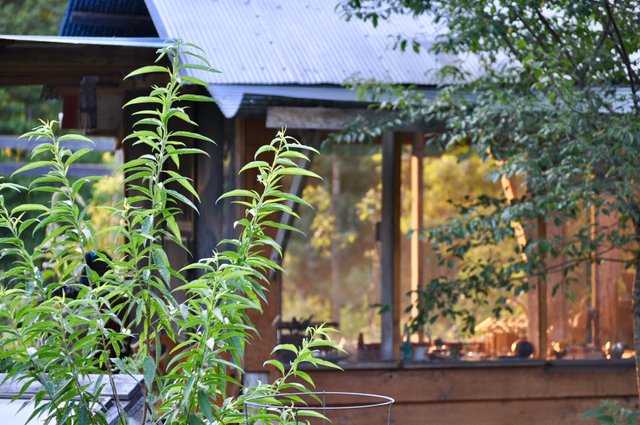
Almond tree and the gazebo with glorious sunset lighting
We are primarily focused on perennial agriculture and focus on hardy and resilient annuals.
Perennials are long lived plants that have extensive root systems and don't require yearly soil disturbances. One strategy is selecting the species that do well without much input from us. We focus on natives like Aronia and false wild indigo, mulberries and paw paws that have lived here much longer that we have. They are seemingly unaffected by this heat.
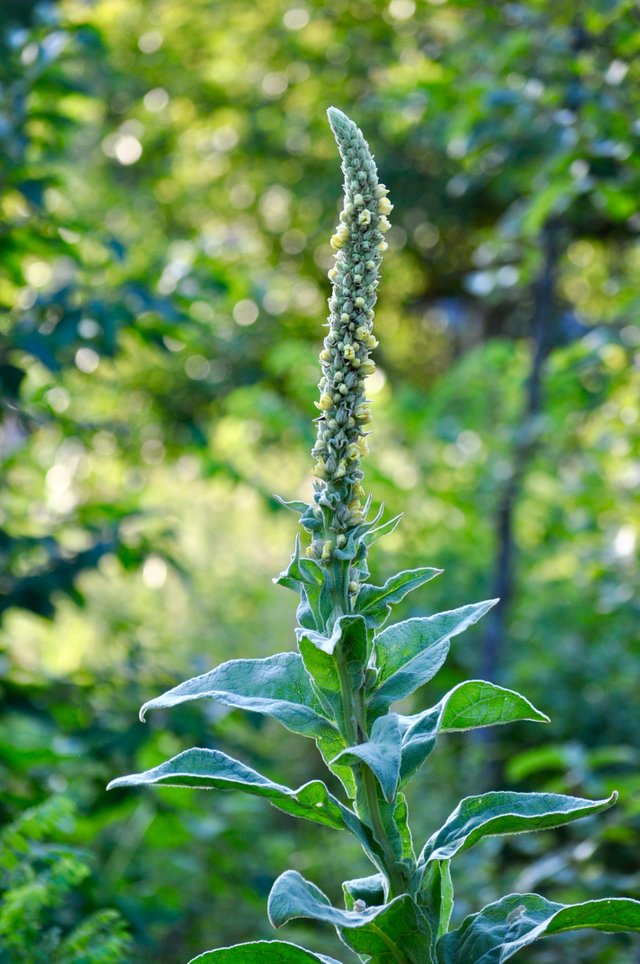
Mullein, a native medicinal plant, is relatively unaffected by the heat and drought
We notice that many of our trees we planted as bare root stock last fall are doing quite well and this relates to our next strategy of MULCH.
We have given each tree a generous helping of wood mulch in an effort to mimic healthy forest system. We also have added manure and biochar to many of our tree and mycorrhizal fungi at planting time. All these factors help retain water, feed the young tree, inoculate and feed fungi that supports root growth and insulates the soil from temperature extremes.
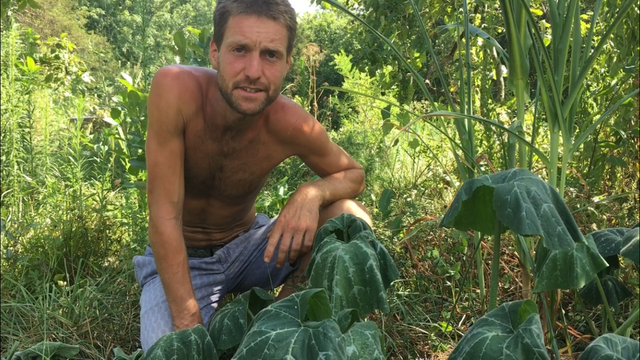
From the annual side of things, much of of squash have succumbed to squash bugs, fungi or are stressed by the heat.
We have been irrigating them some but they show us that to thrive they need more attention. In previous years we have grown sweet potatoes and they seem to do quite well growing in our poor soils during the hot summer months. Some annuals like tomatoes, okra, pole beans and corn are doing quite well for us this year and we happily plant these quick turn-around crops for food this year. I just planted a third succession of beans.
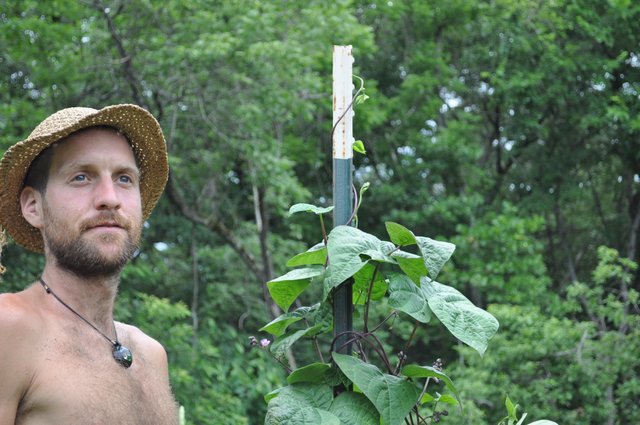
As a global culture we are experiencing ever increasing extremes in climate and are faced with a series of problems. We are dependent on a few annual crops for our food that rely heavily on inputs (usually petroleum derived) and irrigation (using groundwater at an unsustainable rate). We believe the solution to this is Permaculture.
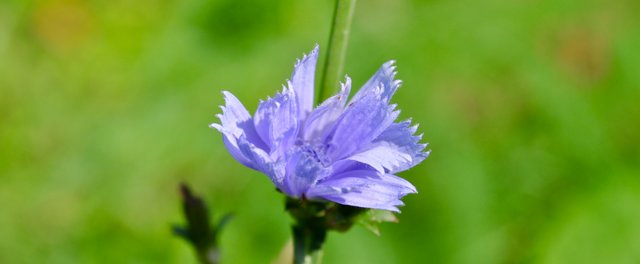
Chicory flower
Permaculture is an ethically based design system (referring to permanent culture or permanent agriculture) with a series of guiding principles to create and maintain place based systems.
It considers the future, the land, the climate, the soil, the wind, the rainfall, the watershed etc... It's truly a holistic system that seeks to create harmony between meeting of our human needs and promoting the vitality and balance of the ecosystems of this planet. We're doing the best we can to embody our values by creating a thriving Permaculture homestead focused on perennials that love to grow here.
Thanks for tuning in. It's time we go dip in the creek.
▶️ DTube
▶️ IPFS
I wish the video would play for me. :(
dtube is down right now server-wide- try again tomorrow perhaps
The climate it is a changin'... I like what you are doing to understand how global changes affect mountainjewel. I have been fascinated by the idea of adapting to the changing climate by changing planting/harvesting cycles and considering plants normally grown in warmer climes maybe drier too. While I hate the idea of just accepting global warming, farmers have traditionally been slow to adapt to change. Perhaps this can be another way that Permaculture leads us.
yes it certainly is! dylan twang and all! i definitely believe this is a way permaculture can lead us. when we look at its two root words: permanent + culture, we realize that its scope is much larger than just growing food, but creating integrated and resilient well designed systems which allow us to prepare for and even thrive in the changing times that are here now and will continue coming! it's really the time to start shifting now! drought tolerant perennial polycultures need to be popping everywhere!!
There is an interesting documentary about this guy who created sustainable green zones in the desert through permaculture. I forgot the name of it but it might be something tht can give you some more ideas. That being said adaptation to the changing climate might be necessary but we also need to start making changes to prevent further damage such as adapting a plant based diet , going green , choosing renewable energy sources ect. if we do not the predictions are dire. It is estimated that if humanity does not go largely plant based in the next 5-7 years 50-60% will become uninhabitable. And don't even get me started on the oceans. And our use of oil and natural gas is the straw that will break the camels back . fact is corporations and politicians are not going to change this , it is up to us the consumers to say no and change things. There is no hero coming either we change as individuals or it all goes to hell ...
I think you're referring to Geoff Lawton's greening the desert. Amazing stuff indeed. Plants beget plants and more water and more life, that's the basics. I agree with changes, but having been vegan for 8 years, It simply isn't the right option for me. Instead hunting wild game and humane animal husbandry.
There really is no way to humanely kill someone who does not want to die. that being said i am aware that not everyone believe that animals have rights. So let us move aways from the animal rights debate for now. Having livestock is not sustainable and causes harm to our planet no matter how they are held . While i do not condone it hunting is really the only option that does not cause damage to the planet if it is done in moderation and with the correct practises. As for permaculture i am trying to see how i can create an urban variation on my small property together with other things like aquaphonics ect. I am working on getting rid of my watercloset and using a composting loo instead ...eventually i want to go fully off grid smack in the middle of the city and show others how to do it too ...
Animals aside, getting rid of WC is a great choice. Although animals will be digesting the humanure. You could convert WC to aquaponi setup ahaha. I think the AP Is a great route.
What a great vision, do it! ,I've heard of folks doing this although zoning and such can be tricky. Do you sprout much? That's a great option for small scale food production.
As far as I know if you install a backyard garden composer, you can legally use it to manage your humanure. The 5 gallons bucket system is a great option for urban settings.
Best of luck in your endeavors, seems like you have big visions. All the best!
i live in the deep south of NC but for some reason my city has really environmentally friendly rules , rainwater collecting allowed , composting allowed , wind turbines allowed ect... as for the humanure done right they will never even know what i am composting lol and i own the house :) it will all take a bit as i am disabled but i believe i putting my money where my big mouth is lol .one step at the time ...
Great to hear it. You have a lot of options then. Day by day you're making the dream a reality.
We have a problem with very dry periods here, and it's one of the reasons that a food forest is difficult for us. We've definitely planted with a drought in mind, as we know full well what that looks like here. If we lose a tree or so, they arent meant to be here. We plant trees in the hope they'll send roots waaaay down into the water table below so they'll survive dryer periods, and use native mulch for the natives and other mulch for the not natives - it's an arduous task!
You're using your noggin on this one! Sounds like you have quite a great strategy. We mourn the loss of the plants that don't make it, but as you say they may not be meant for the climate. Long droughts a can be hard, even with thick mulch some of plants stills suffer. I've been spending my labor lately hand watering with 5 gallon bucket and while it's a lot of work, the hope is once the plants are established, they won't need watering. Time will tell.
I like your idea of different mulches, that makes a lot of sense. Ya know even without any mulch some mod the native N fixers (false wild indigo) still are doing great.
Arduous but noble.
I think it's important to be circumspect with the plants that grow in your area. If they don't make it, they weren't meant to be there, and if they're going to take a lot of labour to nurture, maybe they aren't meant to be there either. I've learnt to be a little more ruthless over the years. When I moved to England years ago, I'd lived through 8 years of proper drought with major water restrictions - Jamie couldn't believe how thrilled I was when it rained - the drops of water seemed miracles and I just hadn't seen rain for a really long time. We're not officially in drought now, but that time sticks in the conciousness of those who lived through it, and I really hope we don't suffer another one. Rain is so precious.
Wonderful video, such smart planning with perennial gardening. Planting natives will thrive under the typical conditions from the area, it only makes sense! I love Ini's statement "taking ourselves out of the cycle" you are so correct. Nature knows what works best. Great post @mountinjewel!
thanks mom! the more we look around in these drought conditions, yes it only makes sense. :)
I found it very interesting to listening about your move from annuals to perennials agricolture.
Climate is changing, still I'm not sure wether it's goind towards desertification: where I'm cultivating, northern Italy, we had an extremely drought year -- last year -- while this year is raining almost every single day. So at the beginning of this season I was just concerned in getting the biggest water tank that I could, to collect rain water and be ready for another drought summer. Eventually it turned out that I never had to water plants until now, as it's raining so generously.
Now I'm wondering wether the climate is changing from stable and predictable seasons towards unstable and unpredictable seasons.
Wow. Interesting story. I don't know where the climate is headed, but it seems to be more and more extreme. You're experiencing such an interesting phenomenon. We had the biggest flooding in hundreds of years last year, then the coldest winter in a long while and now a very hot and dry summer. I see it as you do, unpredictable. I am choosing hardy and adaptable species that can handle stress.
What are you cultivating?
I'm starting to market gardening: my largest production is that of potatoes, tomatoes, lettuce, carrots and garlic.
This is amazing solution
It's easy enough to start a new subreddit. You could enable the Wiki there.
Very interesting, keep going!
thanks!
It's my pleasure to help.
It's my pleasure to help.
@berrythief I think you'd like all of the content from these creators!
thanks for spreading the word :)
i like all your blog sir... doing really great
upvote you